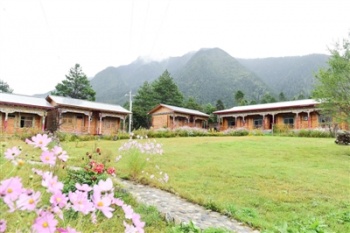Sum Dzong Gön: Difference between revisions
Jump to navigation
Jump to search
mNo edit summary |
Yeshedorje (talk | contribs) mNo edit summary |
||
| Line 12: | Line 12: | ||
==Developments== | ==Developments== | ||
The monks of Sum Dzong Gön used to deepen their study in [[Ganden Jangtse]], | The monks of Sum Dzong Gön used to deepen their study in [[Ganden Jangtse]], one of the two main colleges of [[Ganden Monastery]], and in [[Sera Mé]].<Ref>Phurbu rdo rje (1988), sPo bo lo rgyus, ''History of Powo'', Lhasa: Bod ljongs mi dmangs dpe skrun khang.</Ref> | ||
==Main Practices== | ==Main Practices== | ||
Latest revision as of 14:26, 23 March 2021

Sum Dzong Gön aka Sum Dzong Gön Tashi Chöling (Tib. གསུམ་ཛོམས་དགོན་བཀྲ་ཤིས་ཆོས་གླིང་, Wyl. gsum ‘dzoms dgon bkra shis chos gling) is a Geluk monastery of Powo.[1].
Location
Sum Dzong Gön is located in the township of Sum Dzong, in the south-eastern part of Powo, on the banks of the Chö Dzong Chu.[2]
Foundation
Sum Dzong Gön was founded in 1465 by Jangchub Gyaltsen as he unified three smaller monasteries into a single institution.
Description
The monastic body comprised of 134 monks and had two temples, with a statue of Buddha Maitreya as a centerpiece.
Developments
The monks of Sum Dzong Gön used to deepen their study in Ganden Jangtse, one of the two main colleges of Ganden Monastery, and in Sera Mé.[3]
Main Practices
The main practices of Sum Dzong Gön were those of the Gelugpa tradition.
Notes
- ↑ A map of the early 20th century shows the spelling “Sum Dzong”. The spelling is Sum Dzom in ‘Phurbu rdo rje (1988), sPo bo lo rgyus, Lhasa: Bod ljongs mi dmangs dpe skrun khang’.
- ↑ Emeric Yeshe Dorje, The History of the Düdjom Tersar, forthcoming.
- ↑ Phurbu rdo rje (1988), sPo bo lo rgyus, History of Powo, Lhasa: Bod ljongs mi dmangs dpe skrun khang.